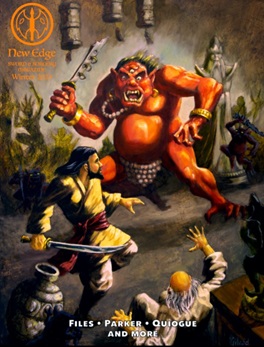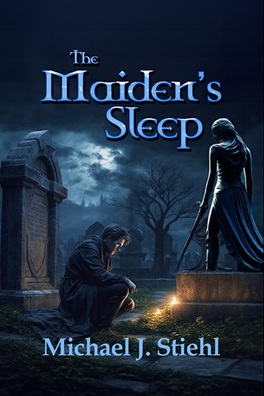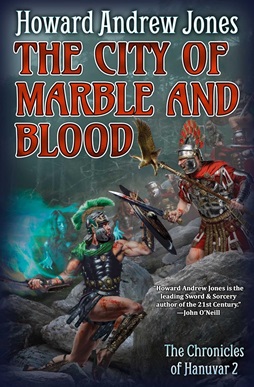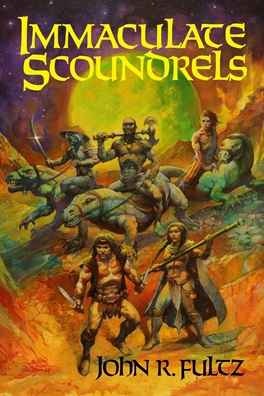THE PRICE OF MOKERY IN DALLIUM
THE PRICE OF MOKERY IN DALLIUM, by James Rowe
For a thousand years it has been a crime in Dallium to insult a philosopher in public without proof of the veracity of the insult. The law stemmed from shortly after the time of the philosopher Placles and was occasioned by the explosion in discourse this great, but troublesome, thinker had sparked in the populace of Dallium and greater Aehica. As it goes with such things, as soon as the interest was found inspired even amongst the common men, civility was entirely lost and the main form of argumentation quickly became ad hominem, with no insult, however vile and untrue, not being commonly employed. In turn, this lead to eruptions of regular bouts of street-clearing violence, and as such a law was soon passed that criminalized all public insults which could not be substantiated. That the penalty was especially strict–consisting of being locked in a peculiar cave set in the mountains outside of town from whence no one had ever escaped–had conspired to largely eliminate the practice of fools insulting the wise.
It did not, however, stop one such fool (by profession a potter) named Strato. Strato had lost his temper one day, insulted the wrong philosopher, and found himself locked in the cave—after a march without dignity, but much in the way of shouts and screams—to suffocate slowly not a week after.
After a thick, granite-door slab was rolled to once more plug the entrance through which Strato was pitched into his prison with a firm kick to the backside by a burly guard, his surroundings revealed their grimness to the potter. The cave was dark without reprieve of even a glimmer of light, stuffy to the point of stifling, and as dusty as the bone-yard with walls so hard, and so thick, that even his frenzied scrapings, and all his furious poundings, did little more than disrupt some cobwebs, and leave bloodstains against the unyielding stone. Panic thus shortly gave way to despair, and then to terror, when a mysterious voice spoke from amidst the murk, “Well-well, another insolent wretch has been locked away.”
Terror didn’t freeze Strato, however, though it altered his purposes and he broke from his attempt to find an escape to press tightly against the wall and dart his blind eyes helplessly through the consuming darkness. He wedded this effort, failing though it was, to calling out into the darkness, “Who is it?!” Though of course, Strato hoped he would not hear anything back at all, such was his fear.
“Placles,” answered simply the voice with a vague hint of amusement in its tone. “And you are one scared fool.”
“Placles?!” asked Strato in dismayed terror which cracked his voice and stuttered the tongue. “The philosopher dead for a millennium? There is a ghost in this cave?”
“No, you silly fool, that is simply my name,” replied the voice with further hints of exasperation. “I am but a statue, animated with a peculiar life, and created in facsimile of your famous wise man. Here, look at me.”
On command, the clicking of a flint against a metal surface lit a jet of gas which palely illuminated the totality of the cave. The light dazzled Strato’s eyes for a second, but nonetheless did not blind him so badly that he could not the moment next see that the statue was true to its word, as it sat against the far wall of the cavern in brazen likeness of the philosopher Placles with a curious mechanism attached to the jaw which occasioned its movement and trumpeted words from out the belly. How this statue worked was a mystery, but it did as Strato could both hear and see.
“See?” insisted the Statue. “I am just a construct, not a ghost. Worry not.”
Suffice it to say, the fact that an automaton of a statue begged Strato to keep his calm did not do much to allay his terror. Still, his curiousity would not burn in the fire of his fear, and thus did he inquire, “Why are you here?! To mock me for insulting your fellow wise man?”
“Well that,” answered the statue with a clanging that stood in for laughter, “and to afford you a chance at freedom.”
“Freedom?” asked Strato the sudden eagerness of a mouse afforded an opportunity to escape the cat. “Freedom, you say?”
“Yes, freedom if you are clever enough. None have been so far, and by my count, thirty-two hundred and seventeen men have died here. Every year or so they clean out the bodies and add lamp oil to that jet, so you won’t find any bones to corroborate my stories, but I am as truthful as Placles was in life, if not a bit more ornery. Are you interested?”
“I die if I am not, so yes.”
“Good. Well then it is simple: You answer my riddle correctly and you shall find the way cleared for you.”
Strato’s nerves did not permit much in the way of patience and he shouted, “Speak then, speak!”
“How quick fear turns into desperation,” remarked the Statue with another bit of that laughter-clanging. “No matter: Here it is. See to it that your tongue which was quick enough to insult a philosopher is paired with a quick enough mind to figure this out before your time is up. Oh, and you should know, that flame is assuredly going to burn the rest of the air out of here far quicker than would it otherwise would be depleted. You haven’t but an hour at most–
“Out with the riddle!” Strato snapped.
“Down boy! Here, no more hesitation: How can something which never moves leave that which it has never been in?”
Strato was not himself a philosopher and as such the riddle was one which struck him dumb from the moment of its utterance; or else, dumber, for he was not especially bright to begin with. But he was stubborn enough to have the virtue of persistence and he eventually collected his wits well enough to hazard an attempt to solve it. After all, reasoned Strato, it was either think or die, and he preferred the former over the latter, laborious though it might be.
However, Strato first had a question to ask of the Statue, “Is this some trick?”
“No, it is no trick. It is straight forward. Also, I am not going to give you a hint, so please, do not waste your time and breath in asking for one.”
“Damn it,” muttered Strato to himself, “the Statue knows even what I was going to do next.”
“Are you going to insist on thinking aloud?”
“Does it matter?”
“It is quite troublesome. My bronze ears are very sensitive.”
“Well, then I apologize in advance.”
The Statue did not occasion a reply to the insistence of Strato to think vocally, so that Strato simply did just that without further disputation over the subject. “Well now, isn’t that a peculiar question. To get out of where something’s never been in….Well, hmmm.
“All right…yes. Yes, I think this is a good start. Well first off: It can’t well be something that is contradictory, because even a potter like me knows enough of philosophy to know that contradictions are impossible. So it isn’t going to be literal, as you can’t leave what you never were in. I mean, you have to be in something to leave it, so it has to refer to something which only seems to be in something.
“But what could that be?” this gave pause to Strato who had to mull over his options. He popped up a few minutes later with, “Well, what about a mirror? When you look into a mirror, or into anything that reflects your image, you only have to move for the image to leave its bounds because it was never was there in the first place to leave!” Joy leapt into the features and voice alike of Strato as he kept at this line of thought, “Ha-ha! I think I got it!”
“Is that your answer?” the Statue interrupted.
“Wait a second!” Strato said with caution overtaking exuberance. “I am not so sure. Let me think a moment more.”
“It’s your life,” nonchalantly remarked the Statue.
Lucky for Strato that his stubbornness should be wedded to a late-blooming–would that he had kept his peace in the crime itself–reluctance to act on impulse, for his hesitation afforded him the chance to see a blatant error in his reasoning. Though it rendered him powerfully crestfallen, such that his admission was filled with sighs, he corrected himself, “Ah, but that’s the rub: The riddle says you can’t move. I suppose that is to stop people from answering a mirror.” Worse, it left him at a loss, “So then what? To think I was so close, too!”
All Strato could do was to return to thinking, for he knew intuitively that wallowing in his defeat would avail him only a lighter head from the increasingly rarified atmosphere of the cave. Braving a growing headache from too little oxygen, and after several long minutes of cogitation which found him humming and making various other semi-intelligible noises, he spoke again, “I suppose I have to go back to the fact that it can’t be literal. So it has to seem, rather than be. But what would seem other than a mirror to be in something it isn’t? It can’t be something similar like a reflection pond, so it has to be something else…
“Wait a moment!” said Strato in a bout of inspiration that seized him suddenly. “What if I were…” he did not finish his sentence, but rather put thought into practice as he dropped to a knee and used his index finger to draw upon the dusty ground. “I had seen this many times in my pottery designs,” he remarked as he drew the figure of a cube, “and always thought it was curious. If you stare at a cube long enough, you see it shift. So if you place a dot in the inner left corner from one perspective,” he punctuated this statement with the placement of said dot, “if you look at it for a bit longer, it’ll appear to be on the outside!”
True to his reasoning, from the perspective of the potter the dot shifted to an exterior corner from whence it first appeared to be. “I think I got it!” shouted Strato, the excitement rising into his voice in a subsequent series of yelps. “Yes, yes, I think this is it!”
“Do you now?” the Statue asked with a flat annoyance. “Recall that you said that a moment–”
“Yes, yes, I know!” Strato interrupted, his exuberance refusing to suffer the killjoy Statue. “But this satisfies everything! There’s no movement, it isn’t ever literally ‘in’ something, and by the perspective it shifts out!”
“So what precisely is your answer?”
“You shift perspective so that which was in becomes out!”
It is hard to say that a statue was dumbfounded. After all, in what way can a statue display this, even one such as this? Still, were a statue to ever come close to displaying abject dumbfoundedness, the Statue did so upon being given that answer. Indeed, because it had the gift of speech, it could even exclaim an almost uncharacteristic “Well, I’ll be damned!” to express his shock while the heavy slab which plugged the exit way swung slowly open, bathing the interior of the cavern with a great gust of cold, clear, mountain air and bright shining light. Strato was freed and the Statue proclaimed as much, “Of all the men who have come here, you are the first to answer rightly. All I ask before you leave is this: Don’t tell anyone the secret. You Dallians are a rambunctious bunch, and if someone wasn’t keeping you from insulting each other, you’d just go back to the ancient ways.”
But Strato didn’t answer. He just grinned like a child and ran out, shouting aloud that he was free.
The End
_____________________________________
James Frederick William Rowe is a Rhysling-nominated poet and author out of Brooklyn, New York. In the last few years, he has cut out a substantial niche in the speculative poetry front, having seen over forty poems published internationally in such markets as “Big Pulp”, “Tale of the Talisman”, “Heroic Fantasy Quarterly”, “Andromeda Spaceways Inflight Magazine”, and “Bete Noire”.
His story, “Tethers” came out at Baen.com, and a story called “The One and the Many” is out at Cosmic Roots and Eldritch Shores. He has a story, “Where Everybody Knows Your Name”, pending at Daily Science Fiction. He’s also had a story accepted to the No Sh!t There I Was anthology, “Steal from the Sun”
When he is not writing verses and crafting yarns, James is employed as an adjunct professor of philosophy in the City University of New York, is pursuing a Ph.D. in the same subject, and works a variety of freelance positions. The author’s website can be found at http://jamesfwrowe.wordpress.com.





